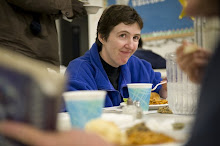We have been absolutely, positively, amazingly surrounded by angels.
The living, breathing human kind.
Even the bedbug on my neck the first morning (this is Andee writing) counts as an angel, because it got us—rapidly—out of a barely tolerable hotel into one which...well, more about that story later.
When K. found out that she was being sent to Riverside for treatment, 400 miles away from home, and especially when she was told that she would not be allowed to use her cell phone in the hospital, nor have internet access, she sent out a rapid SOS email. Some of you may have gotten it. Essentially it said, here’s what’s happening, I’m going to be isolated from my entire support community, if you are in or near Riverside, please come visit me in the hospital.
Among others, the email was sent to a sort of unofficial listserv for CDSP (seminary) alums. Where someone whom K. can’t even remember ever talking to (she was finishing her MA as Kirstin was entering the school) read it—and promptly forwarded it to friends at her former parish in Riverside.
Within minutes we were getting emails offering us transportation to and from airport, dinner on arrival, hospital visits, communion whenever we felt in need of its comfort and strength, assurance from someone who had been in Kaiser Riverside a few months earlier that K. would indeed be able to use her cell phone, offer of loan of the rector’s Sprint aircard so K. could access the internet from within the hospital. Love. Pure, unadulterated, unconditional love.
The team from St. George’s Episcopal showed up at the hospital the night of Kirstin’s admission with a huge gift basket of edible goodies. They then disappeared for a few minutes – and came back with a huge icechest and various containers, and proceeded to produce an entire feast. Fajitas, roasted potatoes, roasted red bell peppers, hot and fresh off the barbeque, with all the fixings. Phyllo dough pastries, with cheesecake, lemon curd, and two kinds of chocolate mousse. Not to mention the option of fresh blueberries. Home-baked cookies for the medical staff. Offers of anything and everything we could need. The staff couldn’t believe we’d never met these people before, because we were all having such a good time!
We asked if K. might borrow a warmer blanket—three appeared the next day. They washed our clothes to make sure none of the aforesaid bedbug’s cousins come home with us. They’ve supplied paper towels and tupperware and other essentials so I could set up a semblence of housekeeping from my hotel room. We’ve been offered a house to stay in for any other visits this summer. They’ve visited every day, as comfortably as if we’d been friends all our lives.
Love. Pure, unadulterated, unconditional love.
It puts any hospital visits I’ve ever made to shame, and teaches me more about radical hospitality than I ever dreamed.
Before Kirstin’s first procedure (putting in a central line Thurs. evening), the rector came and annointed her.
Today two other seminary friends (both now priests) came to the hospital, and we celebrated eucharist together. Love, laughter, faith, hope. “I am the true bread. Those who eat of me will never die.” It has a new meaning, this resurrection text, when proclaimed in the hospital, in the presence of someone who may be terminably ill, and yet is today so very much alive.
Love. Pure, unadulterated, unconditional love.
Christ’s love, holding us in the scary places, filling us. Believing us.
Then early this evening, I came back to the hotel briefly. Dropped in at the office to thank them for repairing something I had reported. The resident manager – he relocated here less than three weeks ago, asked how K. was doing. Really asked, not just a formality.
“We serve breakfast here every morning, free, good stuff, take anything you want and bring it to her in the hospital. The day you’re due to check out, if you need to stay later in the day, don’t worry, there won’t be any charge. This isn’t about money, this is about taking care of people. That’s what matters. When you come back down here, it doesn’t matter if you’re not staying in this hotel, here’s my card, my name, my phone number—if you need anything, just call me or my wife.”
Angels, as I said.
Lots and lots of angels.
Whatever happens, we have been surrounded with love.
Christ is with us; we have been fed.





